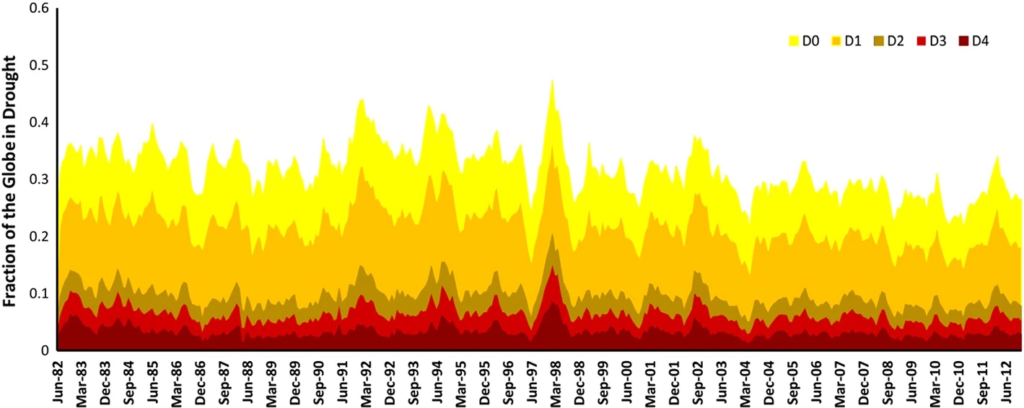- Drought is a complex phenomenon, not a purely meteorological event.
- Claims that droughts are becoming more frequent or intense are not supported by consensus science.
- There is a scientific debate about the relationship between global warming and drought.
Drought is a consequence of global warming that drives many fears about the future. But like heatwaves, the definition and detection of a drought is not as straightforward as meteorological phenomena such as rain or wind, and are instead defined by deviation from a norm or average. Some places are naturally much drier than others, and seem to have always been drier throughout history. So a wetter region’s drought may be much wetter than an episode of wet weather in a dry region. And historical evidence from other places suggest that long term changes between wetter and drier conditions confound even the definition of ‘climate’, which by some interpretations means simply a statistical average of 30 years of weather.
Claims that droughts are becoming worse throughout the world, and constitute the ‘climate emergency,’ are not supported by IPCC AR6:
The regional evidence on attribution for single AR6 regions generally shows low confidence for a human contribution to observed trends in meteorological droughts at regional scale, with few exceptions. (11.6.4.5)
There is still limited evidence and thus low confidence in assessing [hydrological deficit] trends at the scale of single regions, with few exceptions. (11.6.4.3)
There is medium confidence that human influence has contributed to changes in agricultural and ecological droughts and has led to an increase in the overall affected land area. (11.6.4.5)
The UK Met Office explains the difference between these different types of drought:
Meteorological drought – when rainfall in an area is below average for the region.
Agricultural drought – when lack of rainfall or dry soil affects farming and crop growth.
Ecological drought – like agricultural drought, but when lack of water affects the local environment as well
Hydrological drought – when water supplies such as streams and reservoirs are low, which can be caused by low rainfall, lack of snow melt, or other reasons
The ‘medium confidence’ attributed to the finding of human influence in agricultural and ecological drought is a subjective measure of IPCC authors’ judgement that there is not sufficient evidence or agreement within the scientific literature for a ‘robust’ conclusion. This should be seen in contrast to claims that a consensus exists and is ‘unequivocal’.
The detected changes in agricultural and ecological droughts is ‘due to increases in evapotranspiration’, claim the IPCC, which has ‘been driven by increases in atmospheric evaporative demand induced by increased temperature, decreased relative humidity and increased net radiation over affected land areas’. However, neither the degree of this effect nor the increased extent are quantified. And so what remains of this claim should be considered in the context of its uncertainty; the increased precipitation that the IPCC attributes to anthropogenic climate change, the lack of climate change signals in agricultural production indices in all regions, and other drought-related climate metrics.
A 2022 study that reviewed literature (including the IPCC) on the principle factors that seemingly comprise the ‘climate emergency’ observes that the IPCC’s assessment on effect of global warming on the incidence of drought changed significantly between AR4(2007) and AR5(2013). AR5 stated that ‘conclusions regarding global drought trends increasing since the 1970s are no longer supported’. It cites a 2014 study which compiled global observations of drought, and determined that there is no evidence of increased meteorological drought.

On the subject of ecological and agricultural droughts, the 2022 paper cites a study that ‘analysed global trends in agricultural drought using the satellite-based Vegetation Health (VH) method for the period 1981–2018’ and found that, despite increased global temperatures, ‘drought has not intensified and expanded’ over the period – a conclusion which seems to be shared by other studies cited in the study. This suggests, as the IPCC’s confidence statement also indicated, significant scientific debate on the issue.
This is very far from stories that routinely feature in news media, about drought becoming the ‘new normal’ for the UK, or the world, and that arid conditions are already making agriculture more difficult (a claim which is considered elsewhere on this website).
